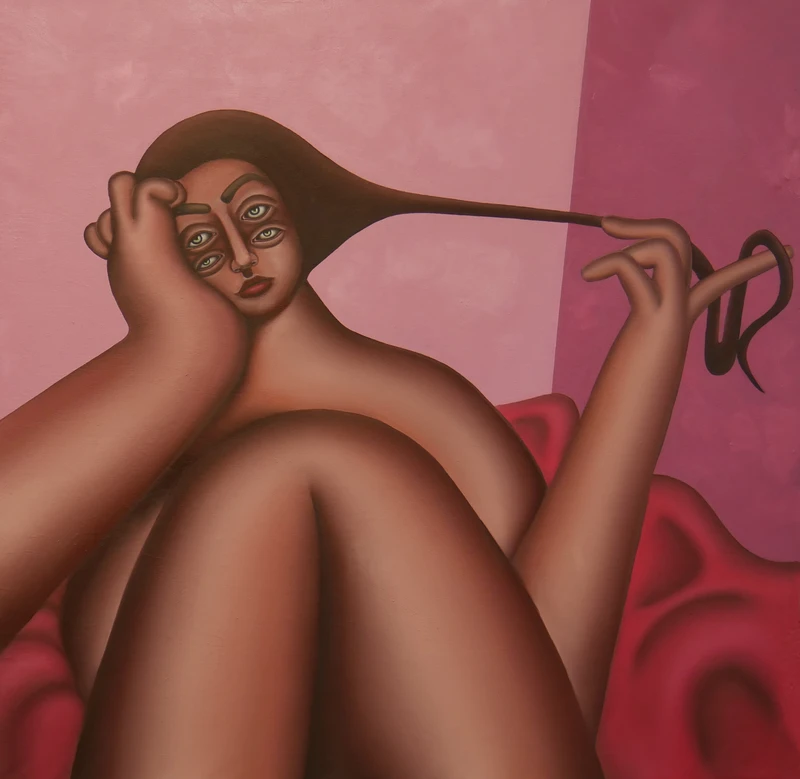Georgia Dymock: Under our Together
10 Mar-9 Apr 2022


In this new display of works, the young female British artist engages the audience with captivating art-deco-esque surrealist figures, which bridge the physical and digital realms. Born and based in London, contemporary artist Georgia Dymock (b.1998) is currently finishing her MFA in painting at UCL, Slade School of Fine Art. With a BSc in Anthropology, Dymock uses her studies and their influence to create her human hybrid-entity figures that question identity and the female form.
‘Under our Together’ includes twelve new works, all of which are initially digitally rendered and later executed using oil on canvas. The pieces showcase Dymock’s signature style of curvy contorted figures, marked by her thoughtful brushstrokes. Her painterly technique explores the constant push-pull relationship between the physical and virtual world, making Dymock’s work intellectually and visually stimulating. When asked about the title of the show, she states “the flesh that marks out the figurative elements in my paintings both sticks to and challenges the idea of a surface as a defining boundary, the bodies are ambiguous as limbs slip, twist, and fuse into one another.”
Utilising Adobe Photoshop’s immense colour palette to challenge the oil paint medium, Georgia explores and stretches the limitless possibilities and inspirations from her surroundings. Reimagining her friends, family and self, Dymock strips her figures of traditional body identifiers, taking on new meanings and identities that explore contemporary society and gender fluidity of the current generation.
Dymock makes an important note of the influence that Polish artist Tamara de Lempicka’s society portraits have had on her art and the treatment of her figures. As seen in ‘Intertwined Figures with a Fan’, the exaggerated and reimagined curves are playfully inspired by the generous rounded shapes from Picasso’s Neoclassical Period, resulting in the deconstruction of the body into unique gestures. Moreover, the textured background pushes forward the unique physiognomies and androgyny of her characters. As she says, her goal is ‘to have the effect of airbrushing, but the remoteness of the airbrush technique’. She explains ‘I am interested in the ‘imperfections’ that come through the labour of the painterly process, where the paint gathers and hairs of the brush sit on the canvas.’
Additionally, Dymock mentions the influence that the writings of Canadian philosopher Marshall McLuhan (1911-1980) has had on her work. With his most famous quotation - and the one most relevant to her - being ‘the medium is the message’ which encapsulates how technological changes in media have profound effects on human perception. Dymock states “I’m curious about the allure of digital aesthetics, I use the versatile nature of oil paint to capture soft, unblemished surfaces that are typical of the digital. Simultaneously, I embrace the disturbances inherent in the painterly process that disrupt the illusion of a clean finish.”
Dymock constantly comes close to and then distances herself from her artistic process by travelling both physically and mentally between the virtual and physical worlds. Her work eliminates the idea of a fixed identity or a singular self and her human-like characters seek to challenge what it means to be human in a digital age. With the grainy image of a vintage TV screen, a glass of mountain dew, cobalt blue human skin, or a grid pattern used as a background - Dymock creates narratives which juxtapose screen reality and the world before us, and the ways in which they eventually intersect.
Coinciding with the exhibition, JD Malat Gallery has partnered with the public art platform W1 Curates to showcase Dymock’s work across the Flannel's flagship store on Oxford Street. The collaboration will display her new body of work on a monumental scale, allowing the London public to engage with the intricacies of her captivating work. We are pleased to share that Dr. David Bellingham, art historian, author, and Programme Director for the Master’s degree in Art Business at Sotheby’s Institute of Art has written the accompanying essay for this exhibition.